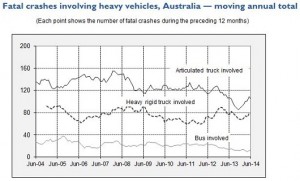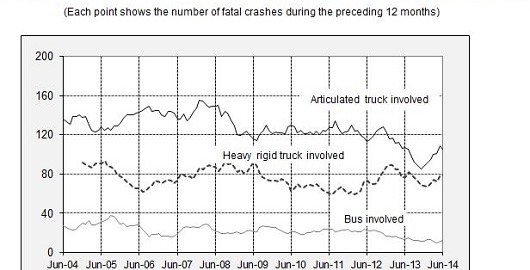Heavy Vehicle Road Fatalities Down but Number of Crashes the Same

With more and more road freight operators complying with chain of responsibility legislation we are beginning to see tangible benefits in the form of less fatal road crashes on our roads nationally, unfortunately rigid trucks are accounting for a greater share of road fatalities in Australia.
According to a report released recently, road fatalities caused by heavy vehicle road accidents have declined but there are still worries that rigid trucks are being involved in more of these crashes.
The Bureau of Infrastructure, Transport and Regional Economics’ (BITRE’s) quarterly report on fatal heavy vehicle crashes recently revealed that over the 12 months to June 2014, a total of 213 people died as a result of 192 fatal crashes involving heavy trucks or buses.
While this is an improvement from the previous year, even one life lost is too many and it should be our goal to achieve 100 per cent safety record with no fatalities at all. In the 12 months to June 2013 (the previous year) 231 people died but the number of incidents was the same at 192. The fact that less people died may just be a matter of chance.
Trucking Industry website Fullyloaded.com.au recently posted an article on the report. The following is an excerpt from that article that explains the situation further:
The latest figure includes 116 deaths from 105 crashes involving articulated trucks, a decrease of 1.9 per cent over the previous year’s figures.
Over the three years to June this year, the number of fatal crashes involving articulated trucks fell by an average of 6.1 per cent per year.
Sadly, the statistics for heavy rigid trucks are trending in the opposite direction.
The 89 deaths (from 79 separate crash incidents) represented an increase of 2.6 per cent from the previous year. Over three years, the figures have risen by an average of 9.2 per cent per year.
Source: Fullyloaded.com.au
Most road crashes involving heavy vehicles are caused by negligence on the part of the operator or the driver and are therefore normally totally avoidable. Sometimes crashes involving heavy vehicles are caused by other road users who don’t understand the workings of a heavy vehicle and perform dangerous and careless manoeuvres on the road around trucks.
Accidents caused by truck driver negligence though are usually as a result of speeding or breaking fatigue management laws. Accidents caused by operators normally have something to do with maintenance of the heavy vehicle. Despite the driver shouldering most of the blame when an accident occurs, the truth is that the operator as well as everyone else in the supply chain has a role to play in ensuring heavy vehicle safety by complying with Chain of Responsibility laws.
Schedulers, consignors, consignees, warehouse managers, drivers, operators etc. must all comply with chain of responsibility laws. In order for them to learn what compliance to chain of responsibility (COR) laws entails, they must undergo COR training, not only will this training benefit the company’s bottom-line but it may also save a few lives in the process.



